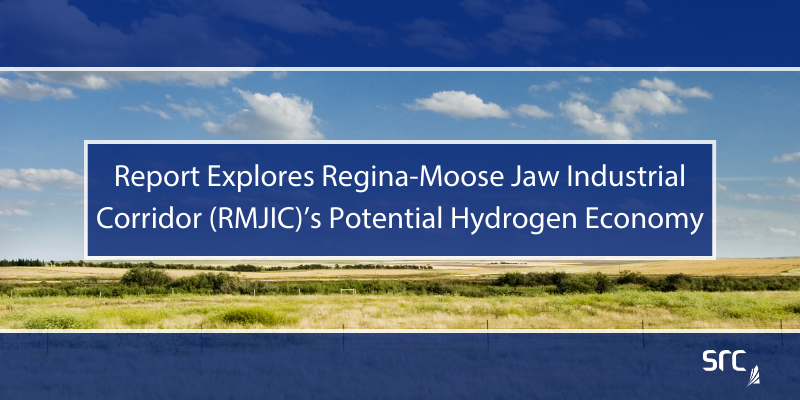A new report from the Transition Accelerator and the Saskatchewan Research Council (SRC) has concluded that a hydrogen hub in the Regina-Moose Jaw Industrial Corridor (RMJIC) has potential for the successful development of an industrial hydrogen supply chain and related CCUS infrastructure.
The global and Canadian hydrogen markets are both expected to grow dramatically in the coming decades—the International Energy Agency estimates low-carbon hydrogen could account for 10% of global energy consumption by 2050, and the federal Hydrogen Strategy estimates the global market for hydrogen could reach $2.5 trillion in that time.
Co-authored by SRC and University of Regina, “Hydrogen Hub Potential: A Feasibility Study for the Regina-Moose Jaw Industrial Corridor” looks at the potential for the RMJIC to tap into that opportunity, producing, using, and exporting hydrogen to help build Saskatchewan’s economy towards a net-zero future.
The RMJIC has many assets that point to its potential for producing low-cost, low-emission hydrogen for domestic and international markets, including an existing refinery that already produces and uses hydrogen, proven CO2 storage in the region, wind and solar potential, and Saskatchewan’s vast uranium resources. Alongside those opportunities, the report examines the potential roadblocks in the development and scale-up of a hydrogen hub in the RMJIC, offering a set of strategic next steps to help address those challenges, and a detailed checklist of near-, mid-, and long-term actions for hub development.
Those steps include:
- Building a regional hydrogen hub consortium to support a shared vision for hydrogen and develop a regional hub strategy
- Developing a CCUS strategy for the RMJIC to leverage and expand upon existing CCUS infrastructure in southern Saskatchewan for de-risked carbon sequestration and scale-up of “blue” hydrogen production
- Leveraging existing pilot initiatives for regional trials to garner public support and spur hydrogen hub investment
- Planning for the development of RMJIC hydrogen fuelling stations (HFS) at the confluence of freight rail lines and Highway 1 in Regina’s east end
- Initiating detailed studies into regional salt cavern storage potential, which will be essential for hydrogen to support the intermittency of wind and solar power
- Initiating the development of dedicated hydrogen pipelines and respective safety codes and practices
- Accelerating the development of low-carbon hydrogen production from sources in addition to natural gas such as renewables and new nuclear
Above all, the report emphasizes that a successful hydrogen hub requires a shared vision for a hydrogen economy in a diverse energy future. With regional governments, Indigenous communities, industry, and civil society united behind a shared vision, a hub and CCS infrastructure in the RMJIC has the potential to provide significant economic opportunity and environmental benefits.
This research was supported by the Government of Saskatchewan’s Ministry of Energy and Resources, Federated Co-operatives Limited and Whitecap Resources.
“This report is a first step to help us understand the potential for blue hydrogen in Saskatchewan,” Minister of Energy and Resources Jim Reiter said. “Our province’s leadership role in carbon capture, utilization and storage (CCUS) makes this energy source an important one for us to consider.”
About the Saskatchewan Research Council
With 76 years of experience, SRC is Canada's second largest research and technology organization with 1,600 clients in 22 countries around the world. With nearly 350 employees and $232.0 million in annual revenue, SRC helps clients solve technology problems, make improvements, increase productivity, and develop new markets. For more information, visit www.src.sk.ca.
About the Transition Accelerator
The Transition Accelerator is a pan-Canadian organization that works with others to identify and advance pathways to a prosperous, competitive, net-zero emissions Canada in 2050. We work with government, industry, Indigenous, and civil society leaders to co-create practical visions of what the future could be, then build step-wise pathways to get there. We see a future where Canada is internationally competitive, with great, permanent jobs in all regions; and we see a Canada that has a prosperous, net-zero emissions economy, and healthy people and communities.
For more information contact:
Peter Hemminger
Acting Director of Communications and Knowledge Mobilization
The Transition Accelerator
phemminger@transitionaccelerator.ca
Francois Biber
Saskatchewan Research Council
Francois.biber@src.sk.ca
(306) 385-4187

